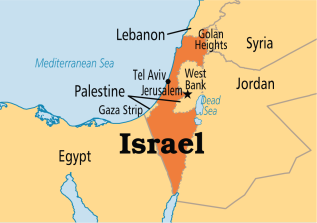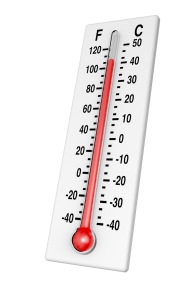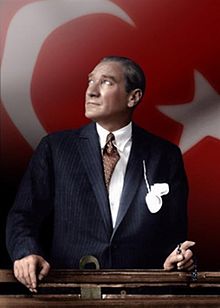
1820 Charles Darwin’s HMS Beagle launched – so pack up and go on a trek to find something you’ve never seen before – a new plant, animal or stone. Take a photo and find out everything you can about it.
1720 Hieronymus Carl Friedrich Baron von Münchhausen born – so tell some tall stories to each other.
National Technology Day (India) – what technology is in your house that your kids would enjoy learning to use? For starting to use laptops, this typing aid might help:
For smart phone apps, try these:
Minnesota Statehood Day (founded 1858) It’s very Scandinavian, healthy and literate.
Nsiga’a Day (a native people in Canada)
Yom Ha Atzmaut (Israel Independence Day 2016)

According to the Torah, God promised the Land of Israel to the Jews in about the second millenium B.C., but the first kingdom of Israel wasn’t established until the 11th century B.C. In 930 B.C. it split into the kingdoms of Judah and Israel. Israel was besieged by Assyria, and Judah was conquered by Babylon. However, when Persia conquered Babylon their king, Cyrus the Great, said Jews could continue to practise their religion there
The area then became more Greek, or hellenised, until the Jews revolted in the Maccabean Revolt in 167 B.C. The Roman Empire invaded in 63 B.C. and appointed Herod as king of the vassal Judean state. This led to the Jewish-Roman Wars, where the Jews tried to reclaim their independent state but lost badly, and went from a major population in the Eastern Mediterranean to a scattered and persecuted minority.
In 634 A.D. the area was conquered by Arab Muslims. The next invasion was the Crusades, in 1099. The Byzantine Emperor had asked the Pope to help repel Turks from invading Anatolia (now Turkey), and instead the Pope decided to take Jerusalem back for Christianity – and massacre all the Muslims and Jews we could find.
In 1187 Sultan Saladin reconquered Jerusalem and invited the Jews back to worship there. By the time the Ottoman Empire conquered the area in 1516, there were more than 10,000 Jews living there, many from Spain which had expelled them.
While under Turkish rule more Jews fled there from Eastern European pogroms (violent riots against one race/religious group). It remained under Turkish rule until WWI, when Britain took it and Palestine, and later divided the area with France. We then decided to divide the area into Jewish and Muslim/Arab areas, although at that time Jews only made up 11% of the population. Increasing persecution from Nazis and the rest of Europe brought another quarter of a million Jews – the Arabs revolted but Britain and the Jewish Legion defeated them.
By the end of WWII Jews made up a third of the population of British-owned Palestine. In 1939 Britain tried to impose limits on Jewish immigration to appease the Arabic population but the Jews revolted and began an armed struggle against British rule. Meanwhile hundreds of thousands of Jewish Holocaust survivors and refugees were fleeing to Palestine and Britain was trying to stop them by putting them in detention camps.
In 1947 the UN decided to replace the British-owned area with an independent Arab state, an independent Jewish state and the City of Jerusalem. The Jews accepted and the Arabs rejected the plan. Then the Arabs attacked the Jews and the Jews fought back, eventually expelling a quarter of a million Arabs as the Palestinian economy collapsed.
Then Egypt, Syria, Transjordan and Iraq allied to invade in the 1948 Arab-Israeli War. After a year a ceasefire was declared and the Green Line border was established. Jordan took the West Bank and Egypt took the Gaza Strip. More than 700,000 Palestinian Arabs were expelled by advancing Jewish forces.
By 1958 the Jewish population was 2 million. West Germany offered to pay $1.5 billion in reparations for the Holocaust. In 1950 Egypt closed the Suez Canal to Israel’s shipping. Israel joined in a secret alliance with France and Britain to attack Egypt, but the UN made everyone stop.
In 1967 after rising tensions (the Arabs had been trying to divert the Jordan River away from Israel, Egypt had stationed an army on its border and blocked Israel’s access to the Red Sea) Israel attacked Egypt; Jordan, Syria and Iraq joined in the Six-Day War, but Israel gained the upper hand, taking the Gaza Strip,the Sinai Peninsula, the West Bank, and Golan Heights. Then in 1973 the Yom Kippur War began with Egypt and Syria launching a surprise attack on Israeli forces in the newly occupied territories. 35,000 people died but Israel didn’t budge.
Then Israel returned the Sinai Peninsula and they nearly began negotiating about the West Bank and Gaza Strip, but Palestinian guerilla fighters bombed them so…everyone went back to fighting. In 1981 Israel even bombed Iran’s nuclear reactor so they couldn’t build a nuclear weapon. From 1987 the Palestinians started an Intifada with violence, demonstrations, economic and cultural protests against Israel, and Iraqi leader Saddam Hussein launched missile attacks at Israel too. Israel did not respond that time.
In 1992 Israel and Palestine finally agreed to some peace measures, but then a Second Intifada was declared until Israel built a wall across the West Bank and withdrew from the Gaza Strip. Hezbollah, the anti-Israel Palestinian fighters in Lebanon, and Israel still attack each other.
In 2007 Israel bombed Syria’s nuclear reactor. An offshoot of the Egyptian Muslim Brotherhood, Hamas, then became the governing body of Gaza Strip to fight Israel into returning to its 1967 borders, and the two still attack each other to this day.
![]()






 1609 Shakespeare’s Sonnets first published
1609 Shakespeare’s Sonnets first published 1927 Charles Lindberg sets off on the first nonstop flight across the Atlantic; 1932 Amelia Earhardt does the same, first time by a woman.
1927 Charles Lindberg sets off on the first nonstop flight across the Atlantic; 1932 Amelia Earhardt does the same, first time by a woman. Josephine Baker Day – an American-born French entertainer who helped in the civil rights movement in America by refusing to perform for segregated audiences.
Josephine Baker Day – an American-born French entertainer who helped in the civil rights movement in America by refusing to perform for segregated audiences. World Metrology Day (celebrates the use of the metre) – how tall are you in metres? How far can you throw a ball? How far can you throw a flipflop?
World Metrology Day (celebrates the use of the metre) – how tall are you in metres? How far can you throw a ball? How far can you throw a flipflop?

 Carlos Manuel de Céspedes
Carlos Manuel de Céspedes
















